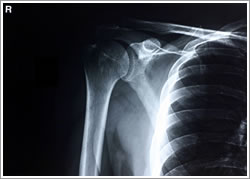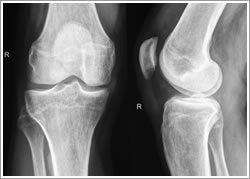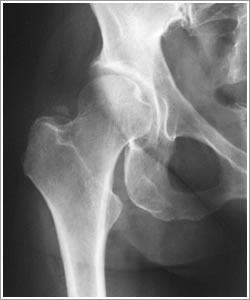 Arthrography basically means injection of contrast (dye) into a joint. Once the contrast is injected, the radiologist takes fluoroscopic spot films (X-Rays) to document the correct position of the contrast in the desired joint. Since the widespread use of CT and MRI, an arthrogram is now rarely performed as a sole diagnostic test.
Arthrography basically means injection of contrast (dye) into a joint. Once the contrast is injected, the radiologist takes fluoroscopic spot films (X-Rays) to document the correct position of the contrast in the desired joint. Since the widespread use of CT and MRI, an arthrogram is now rarely performed as a sole diagnostic test.
MRI Arthrography
A small needle is used to inject special MRI contrast called Gadolinium. X-Ray contrast is also used to make sure the contrast is inside the joint. After the proper contrast is injected you will have an MRI examination. This exam is most commonly used for shoulders, hips and wrists. It may also be used for knees that have had previous surgery.
If you develop fever or severe pain contact our office at 352-333-7847 (7VIP) or call your referring physician. After hours or on weekends, go to the nearest emergency room or call North Florida Regional Medical Center at 352-333-4000 and ask for the Radiologist on call.
CT Arthrography
 After the proper X-Ray contrast is placed into the joint you will have a CT scan of that joint. This is used most commonly when patients can not have an MRI (pts with pacemakers etc.) or in certain instances when there has been previous surgery for the knee or shoulder. Your referring physician makes that determination and consults the Radiologist if necessary.
After the proper X-Ray contrast is placed into the joint you will have a CT scan of that joint. This is used most commonly when patients can not have an MRI (pts with pacemakers etc.) or in certain instances when there has been previous surgery for the knee or shoulder. Your referring physician makes that determination and consults the Radiologist if necessary.
If you develop fever or severe pain contact our office at 352-333-7847 (7VIP) or call your referring physician. After hours or on weekends, go to the nearest emergency room or call North Florida Regional Medical Center at 352-333-4000 and ask for the Interventional Radiologist on call.
Joint Aspiration
This procedure can be performed on essentially any joint in the body when needed. This is a diagnostic test used mainly to rule out infection of the joint. Sometimes certain types of arthritis need to be diagnosed by aspiration of fluid from a joint and analysis in a laboratory.
If you develop fever or severe pain contact our office at 352-333-7847 (7VIP) or call your referring physician. After hours or on weekends, go to the nearest emergency room or call North Florida Regional Medical Center at 352-333-4000 and ask for the Radiologist on call.
Joint Injections for pain relief
Certain joints of the body can be injected for pain relief. The reasons and variety of joints injected are numerous.
 Most often hips or shoulders are injected with steroids and local anesthetic for degenerative arthritis and pain control. This can only be performed three times in most cases. Other joints such as the feet, ankle, hands, wrists, acromioclavicular joint, sternoclavicular joints and others are injected for pain control as well. These types of joint injections can also be used for diagnostic purposes in complex cases.
Most often hips or shoulders are injected with steroids and local anesthetic for degenerative arthritis and pain control. This can only be performed three times in most cases. Other joints such as the feet, ankle, hands, wrists, acromioclavicular joint, sternoclavicular joints and others are injected for pain control as well. These types of joint injections can also be used for diagnostic purposes in complex cases.
For example, a patient with buttocks pain may have the back or hip joint responsible for their pain. The hip joint would be injected on one visit and a back injection such as a nerve root block or facet block may be injected on another visit to localize the “pain generator”.
If you develop fever or severe pain contact our office at 352-333-7847 (7VIP) or call your referring physician. After hours or on weekends, go to the nearest emergency room or call North Florida Regional Medical Center at 352-333-4000 and ask for the Radiologist on call.
Preparing for your Arthrography:
- A representative will contact you prior to your appointment to review your medications and complete your registration.
- You will not have to stop taking blood thinners ( Aspirin, Lovenox, Plavix, Heparin or Coumadin) before virtually all of the above joint procedures. Exceptions may apply so the scheduler will talk to a radiologist or your doctor if necessary.
- You will need to arrange for a driver to take you home if your knee or ankle are affected.
- The joint area to be studied will be injected with local anesthetic, contrast dye and perhaps a steroid. If you have an allergy to any of these medications please notify our representative, scheduler, or nurse as soon as possible. Fluoroscopy, CT or MRI images will be taken after the injection.
- You may experience some soreness at your injection site for up to 24 hours. This can usually be managed with over the counter analgesics such as ibuprofen or aspirin and ice applied to the affected area 3-4 times during the day. You may take your own pain medication if it is already prescribed by your referring physician.
- Limited activity the day of the joint injection. You may resume your current level of activity the day after the injection, as tolerated.
If you develop fever or severe pain contact our office at 352-333-7847 (7VIP) or call your referring physician. After hours or on weekends, go to the nearest emergency room or call North Florida Regional Medical Center at 352-333-4000 and ask for the Radiologist on call.

